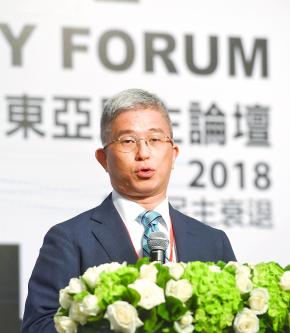Beijing’s “one China” principle is part of the Chinese government’s disinformation campaign directed at harming Taiwan, Open Culture Foundation deputy executive Wu Ming-hsuan (吳銘軒) said yesterday.
Calling China’s official line on Taiwan “fake news,” Wu said Beijing’s assertion that “there is only one China and Taiwan is a part of China” is factually wrong, adding that China is deliberately spreading the false narrative to misguide the international community.
Wu made the remarks at the Taiwan Foundation for Democracy’s East Asia Democracy Forum, a symposium that this year is focused on “preventing democratic backsliding.”
Participants include democracy advocates from the Philippines, Indonesia, Malaysia, Japan and South Korea, among other Asian nations.
In his speech on fighting fake news and protecting democracy, Wu said that disinformation and fake news is defined as the deliberate manufacture and propagation of erroneous information.
Disinformation is an effective tool for authoritarian regimes to create self-serving narratives, and it is also utilized to stigmatize dissidents by undermining their reputation and legacy, he said.
Fake news saturation is a disease that democracies must resist, and the fake news that is doing the most harm to Taiwan is Beijing’s “one China” principle, Wu said.
The reality is that there are two extant Chinese governments, those of the Republic of China and the People’s Republic of China, he said.
Ploys to spread the “one China” principle, including Beijing’s ongoing effort to force international airlines to list Taiwan as part of China on their Web sites, are part of a systematic project to mislead the public to harm Taiwan, he said.
Speaking from the perspective of the Indonesian experience, authoritarian regimes hijack traditional culture and values to rationalize anti-democratic policies, which exacerbates societal intolerance, paranoia, xenophobia, extremism and ethnic divisions, Gusdurian Network Indonesia national head Alissa Wahid said.
Islam is not incompatible with democracy, but Indonesia’s democratic transition has neglected to develop a commensurate educational message that promotes the compatibility of democracy and faith, she said.
Separately yesterday, President Tsai Ing-wen (蔡英文) met with academics and activists to mark the foundation’s 15th anniversary and expressed her wish that Taiwan would develop stronger ties with democracy advocates from other nations.
The foreign guests are visiting Taiwan for the forum and the foundation’s anniversary, and she hopes they will see the vitality and strength of Taiwanese society, Tsai said.
She said she is pleased that the attendees have shared their observations and recommendations for resisting democratic backsliding and combating fake news.
Taiwan’s democratic achievements are internationally heralded, including the establishment last year of Reporters Without Borders’ first Asian regional office in Taipei and the nation’s high and still improving ranking in a Freedom House report this year, Tsai added.d
Source: Taipei Times - 2018/06/27





















